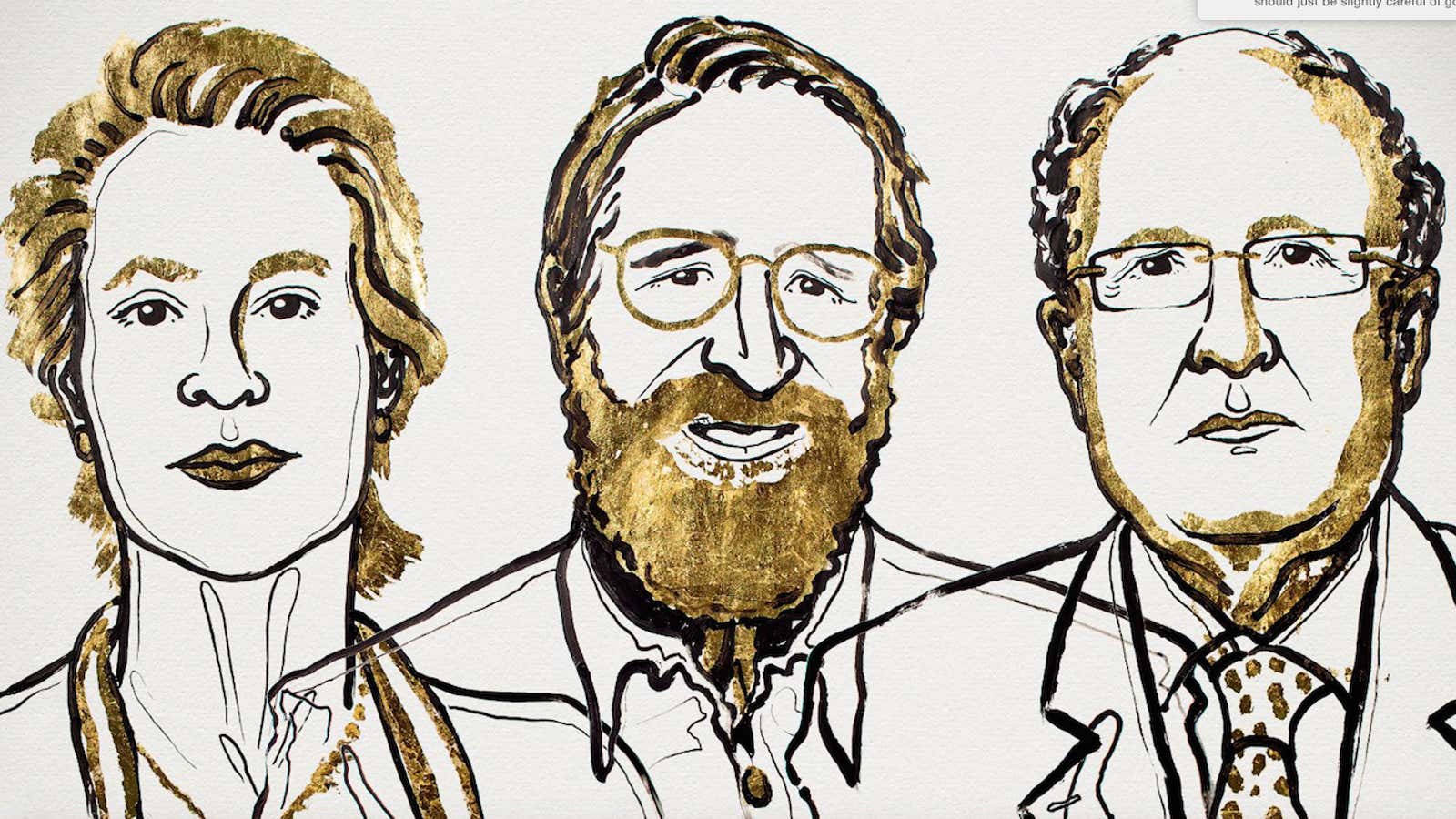In the nearly 4 billion years that planet Earth has existed, life hasn’t had an easy time of it. Our atmosphere once had almost no oxygen. There was a period when climate change was so bad that crocodiles were swimming in the Arctic. And of course, the poor old dinosaurs got wiped out by an asteroid.
Yet through thick and thin, life, in some form, has not only survived but flourished. That’s because life has the remarkable ability to evolve through random genetic mutations and the selection of those endowed with the fittest adaptation. Thanks to the ingenuity of nature, some fish have developed anti-freeze proteins to swim in frigid waters, while mussels have genes producing glue that help them stick to rocks underwater.
It’s amazing that nature can come up with these kinds of solutions. But as it turns out, humans can, too.
The 2018 Nobel Prize in chemistry, announced today (Oct. 3), goes to scientists whose work wields the power of evolution. Frances Arnold of the California Institute of Technology received the award “for the directed evolution of enzymes.” Separately, Greg Winter of the University of Cambridge and George P. Smith of the University of Missouri at Columbia won “for the phage display of peptides and antibodies.”
Arnold’s work has focused on enzymes—the workhorses of human cells. Enzymes are complex chemicals that are able to perform highly specific jobs, for instance, synthesizing sugars. Chemists before Arnold had tried to artificially create enzymes that would perform tasks humans wanted, such as producing a drug that’s expensive to make in factories. But the complexity of enzymes, which helps them be good at their task, stumped the chemists trying to replicate nature’s abilities.
Arnold had a different idea: Instead of making artificial enzymes, why not introduce mutations in the genes that produce enzymes? If lots of cells are given different types of mutations, they all produce slightly different versions of the enzyme. Then we can select the enzyme that performs a task slightly better than nature intended, and use it to introduce even more mutations. This way, after each generation, the enzyme can be slowly be tailored to do our bidding.
Since the 1990s, many people have used Arnold’s techniques, including Arnold herself, to create enzymes that can produce not just pharmaceuticals, but chemistries that didn’t exist previously. The use of such enzymes has also allowed us to cut back on the use of harmful chemicals. And Arnold herself is using enzymes to convert sugars into alcohol that can be used as biofuel, an alternative that could help us wean off fossil fuels and potentially cut emissions.
Meanwhile, Smith and Winter took a slightly different approach to using evolution. First, Smith found a class of viruses that had the ability to invade bacteria and hijack their machinery. Then Winter used the viruses’ ability to human advantage.
The human immune system has something equivalent to a seeker missile: Y-shaped molecules called antibodies. Antibodies are always on the lookout for specific proteins that are behind the processes that cause harm. Once they find the troublemaker, the antibodies tag it and unleash the force of the rest of the immune system to fight.
Winter used Smith’s discovery to create antibodies that can find more proteins behind diseases. Instead of targeting the proteins that viruses are after, Winter changed the viruses’ genetic makeup and caused them to create libraries of billions of Y-shaped antibodies on them. He then selected the antibodies that targeted the harmful proteins he was after.
Since then, Winter has commercialized one such antibody, adalimumab, as a treatment for rheumatoid arthritis. Others have created pharmaceutical antibodies that can neutralize toxins that cause anthrax and that can slow down auto-immune disease lupus. More are under development that could become treatment for Alzheimer’s disease. As the Nobel committee explains, The directed evolution of enzymes and the phage display of antibodies have allowed Frances Arnold, George Smith and Greg Winter to bring the greatest benefit to humankind and to lay the foundation for a revolution in chemistry.”
You can read all of Quartz’s coverage of the 2018 Nobel Prizes here.
